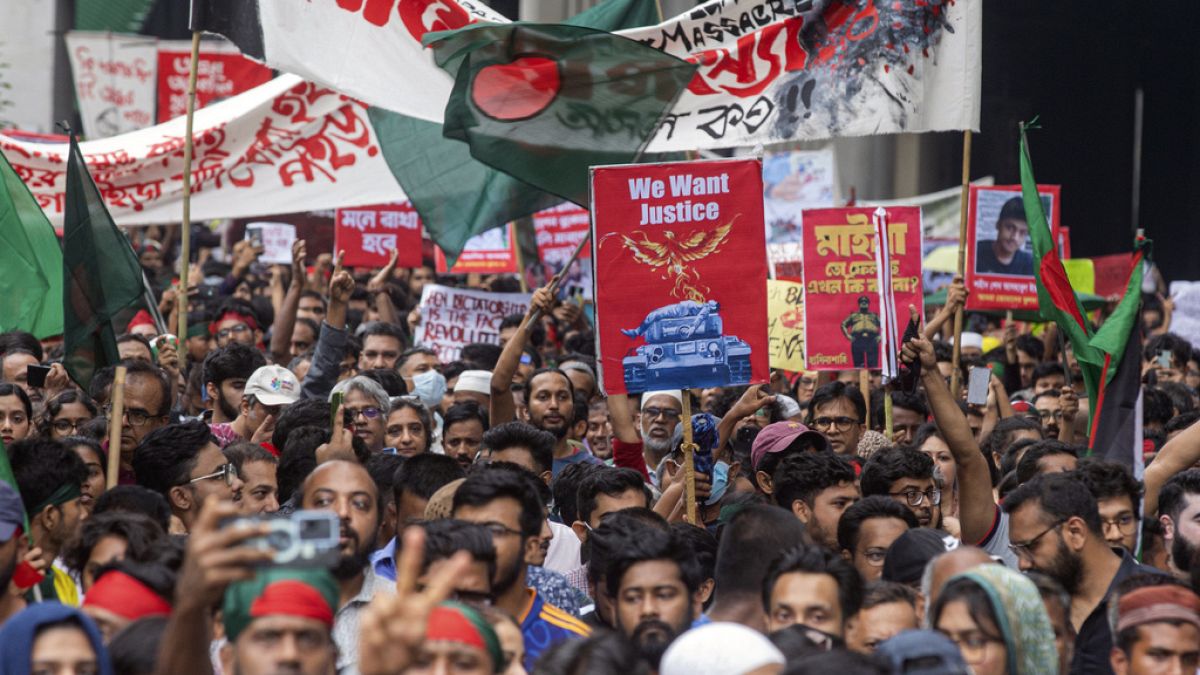In recent news, protests in Bangladesh have escalated into deadly clashes, resulting in two deaths and over 100 injuries. The unrest began as a response to controversial reforms in the job quota system, with over 200 people killed during demonstrations. More than 2,000 protesters gathered in the capital city of Dhaka to rally against Prime Minister Sheikh Hasina’s government, chanting slogans demanding justice for the victims. Clashes between police and students broke out in various parts of the city, with security forces using tear gas and stun grenades to disperse the crowds.
The violence spread to other districts of the country, with police firing tear gas and rubber bullets in Khulna, resulting in 50 injuries. Tragically, a policeman was killed during an attack by protesters in Dhaka, while an arson attack on a local office of the ruling Awami League party in Habiganj led to the death of an electrician and injuries to 50 others. In Chattogram, about 1,000 protesters set a police guard post on fire after marching through the streets following Friday prayers. The situation has escalated beyond peaceful student protests against the job quota system, presenting a significant challenge to Hasina’s 15-year rule.
The unfolding events in Bangladesh have indicated a growing discontent with Prime Minister Sheikh Hasina’s government. The protests, initially sparked by the job quota system reforms, have evolved into a widespread movement against perceived injustices under her long-standing rule. The chants of “down with the autocrat” resonate among the protesters who demand accountability and justice for the victims of recent violence. Security forces have responded with force, using tear gas, rubber bullets, and stun grenades in attempts to disperse the crowds, leading to further injuries and fatalities.
The clashes and violence in Bangladesh have drawn attention to the fragile state of dissent and democracy in the country. As protests continue to spread across different regions, the government faces a mounting challenge to its authority and legitimacy. The deaths and injuries resulting from the clashes highlight the escalating tensions and the high stakes involved in the ongoing unrest. With no signs of the demonstrations calming down, it remains to be seen how Prime Minister Hasina’s government will respond to the demands for justice and accountability from the protesters.
The reports of police firing tear gas and using force against protesters in various parts of Bangladesh have sparked concerns about human rights violations and excessive use of force. As the death toll rises and injuries mount, there is a growing call for independent investigations into the violence and accountability for those responsible for the deaths and injuries. The international community has also been urged to monitor the situation closely and to intervene to prevent further escalation of the unrest. The protests in Bangladesh have underscored the importance of upholding human rights, freedom of expression, and the right to peaceful assembly in the face of growing political repression and authoritarianism.
In conclusion, the deadly protests in Bangladesh have shed light on the challenges facing the country in upholding democracy and freedom of expression. The widespread discontent with Prime Minister Sheikh Hasina’s government and the violent crackdown on protesters have raised concerns about human rights violations and political repression. As the protests continue to escalate, it is crucial for the government to engage in dialogue with the demonstrators and address their grievances in a peaceful and inclusive manner. The international community must also play a role in monitoring the situation and advocating for respect for human rights and democratic principles in Bangladesh. The protests serve as a stark reminder of the importance of upholding democratic values and protecting the rights of citizens to peacefully express their dissent.











